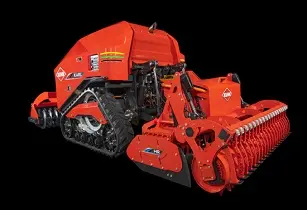Machines by German feed mixer manufacturer, SILOKING Mayer Maschinenbau GmbH have been selling like hotcakes following their integration of Volvo Penta’s D5 and D8 engines across their SelfLine self-propelled range, ahead of the Stage IV emissions legislation
According to SILOKING’s senior director Procurement Karl-Michael Stieglbauer, the two companies have now delivered more than 3000 SelfLine feed mixers, with more than 50% of those being powered by Volvo Penta. Moreover, changing out the engine took just 10 months, thanks to strong support from Volvo Penta.
The collaboration and engine design boasts the advantage of simplifying the process of meeting diverse power output requirements for different climate zones and worldwide emissions regulations. The consistent basic footprint of D5 and D8 engines as they evolve to meet next emissions steps – from Stage IIIA to forthcoming Stage VI, and China IV – helps reduce development time for new machines and facilitates SILOKING’s market expansion with minimal modifications.
Extensive parts commonality between the D5 and D8 engines also benefits both OEMs and customers in terms of ease and cost optimisation. Moreover, the pre-mounted delivery of these engines with the cable harness and the plug-and-play design of the exhaust system significantly reduces installation time and costs.
Initial engine installations received greater fine-tuning to ensure optimal operation with the mixers’ hydraulics, resulting in a highly efficient driveline. In top-tier SelfLine models with multiple high-pressure circuits and an open hydraulic circuit, the engine needed various PTO connections. The alignment of engine maintenance with the 1000 operating hour requirements for the rest of the machine, greatly reduces maintenance time and costs, while also promoting higher machine availability.
Dialing in the ideal amount of high torque at low RPM enables the feed mixers to cope with high peak loads when milling. The Volvo Penta engines also produce fewer vibrations at a noise level of just 70.6 dB(A) for more cattle-friendly operations, while consuming less fuel. Working with electronic monitoring and assistance systems such as SILOKING’s data weighing system, the engine automatically reverts to idle speed after mixing concludes.
“The strong cooperation between SILOKING’s R&D department and Volvo Penta’s application engineers has resulted in a class-leading range of vehicles, with a purpose-built drivetrain that is far more suited to the task at hand,” concluded Industrial sales manager at Volvo Penta, Tim Hansen.
For more information, visit: https://www.siloking.com/en and https://www.volvopenta.com





